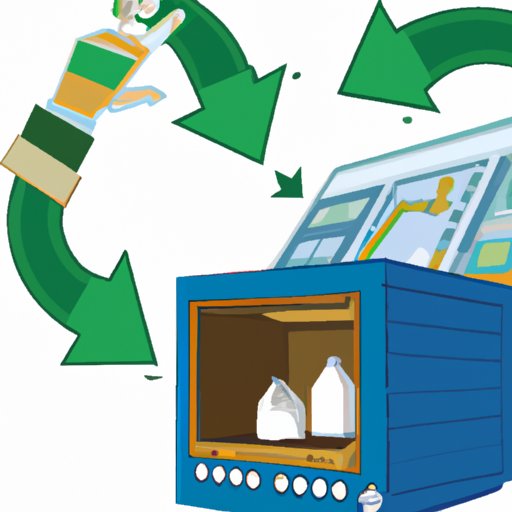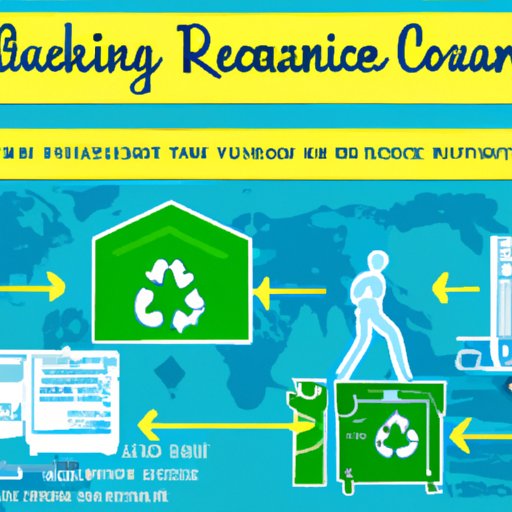Introduction
Recycling is the process of collecting and processing materials that would otherwise be thrown away as trash and turning them into new products. This helps to conserve natural resources, reduce energy consumption, and reduce pollution in our environment. The purpose of this article is to explore how recycling works, its benefits, common items and specialized materials that can be recycled, myths and misconceptions, and how technology is enhancing recycling efforts.
Exploring the Basics of Recycling: What Is It and How Does It Work?
Recycling involves collecting and sorting materials such as glass, plastic, paper, aluminum, and other materials, and then processing them into new products. This process helps conserve natural resources, reduce energy consumption, and reduce pollution in our environment.
The three Rs – Reduce, Reuse, Recycle – are the cornerstones of modern waste management. Reducing the amount of waste we produce, reusing what we can, and recycling the rest is the most effective way to minimize our environmental impact. By reducing, reusing, and recycling, we can help reduce the amount of waste that goes into landfills and incinerators, conserve natural resources, and reduce air and water pollution.
The Benefits of Recycling: Why Should We Do It?
Recycling has many benefits for both the environment and the economy. Here are some of the key benefits of recycling:
Environmental Benefits
Recycling helps conserve natural resources. According to a study conducted by the U.S. Environmental Protection Agency, “recycling one ton of paper saves 17 trees, 7,000 gallons of water, 3 cubic yards of landfill space, and 4,100 kilowatt hours of electricity – enough to power the average American home for six months.”
Recycling also helps reduce air and water pollution. Burning fossil fuels to make new products emits harmful pollutants into the air, while dumping garbage into landfills can contaminate groundwater and surface water. By recycling, we can help reduce these emissions and keep our air and water clean.
Economic Benefits
Recycling can help create jobs and boost local economies. According to the EPA, “recycling and reuse activities in the United States account for 757,000 jobs and generate $36.6 billion in wages and $6.7 billion in tax revenues.”
Social Benefits
Recycling helps us become more responsible citizens. By making an effort to reduce, reuse, and recycle, we are doing our part to protect the environment and leave a better world for future generations.
An Overview of Different Types of Recycling
There are several different types of recycling programs available. These include curbside recycling, drop-off recycling, and buyback centers. Here is a brief overview of each type of recycling program:
Curbside Recycling
Curbside recycling is the most convenient and widely used method of recycling. Most communities offer curbside recycling services, which allow residents to place their recyclable materials in designated containers or bins that are picked up by the local waste management company. This is typically done on a weekly or biweekly basis.
Drop-off Recycling
Drop-off recycling centers are another option for recycling. These centers are usually located in public places such as shopping centers or grocery stores and allow people to drop off their recyclable materials. These centers may accept a variety of materials, depending on the location, and typically do not require any special preparation of the materials.
Buyback Centers
Buyback centers are facilities that purchase recyclable materials from individuals or businesses. These centers typically accept materials such as aluminum cans, plastic bottles, and glass containers. The materials are then sorted and sold to manufacturers who use them to create new products.
What Can Be Recycled? A Comprehensive Guide
Recycling can be confusing, so it is important to know what materials can and cannot be recycled. Here is a comprehensive guide to what can be recycled:
Common Items That Can Be Recycled
Many common items can be recycled, including paper, cardboard, plastic containers, glass bottles and jars, aluminum cans, steel cans, and electronics. Check with your local waste management company to find out what specific materials they accept.
Specialized Materials That Require Special Handling
Some materials require special handling when being recycled. These materials include batteries, fluorescent bulbs, medical waste, and hazardous waste. These materials should never be placed in your regular recycling bin, and must be disposed of properly at a designated facility.

Common Myths and Misconceptions About Recycling
Recycling is a complex process, and there are many myths and misconceptions about how it works. Here are some of the most common myths about recycling:
Common Myths
• Recycling is too expensive and not worth the effort.
• Recycling isn’t really helping the environment.
• It’s impossible to recycle certain items.
• All recycling goes to the same place.
Debunking the Myths
In reality, recycling is actually cost effective and does have a positive effect on the environment. Furthermore, many items can be recycled, and there are specialized facilities for different types of materials. Finally, the materials are sorted and sent to different locations for processing.
A Step-by-Step Guide to Starting a Recycling Program
If you want to start a recycling program in your community, here are some steps to get you started:
Develop a Plan
Start by developing a plan for your recycling program. Decide which materials will be accepted, where the collection sites will be located, and how often they will be collected. You will also need to decide who will manage the program and provide the necessary equipment.
Set Up Collection Locations
Once you have developed a plan, you will need to set up the collection locations. This may involve placing recycling bins in public areas or working with local businesses to set up drop-off points. You may also need to obtain permits for the collection sites.
Educate Your Community
Finally, you will need to educate your community about the recycling program. Hold workshops and events to teach people about the importance of recycling and how to properly sort and dispose of their recyclables. You may also want to develop an advertising campaign to spread the word about your recycling program.

How Technology Is Enhancing Recycling Efforts
Technology is playing an increasingly important role in the recycling industry. Here are some of the ways technology is being used to improve recycling efforts:
Automated Sorting Systems
Automated sorting systems are being used to sort recyclable materials more quickly and accurately. These systems use sensors and robots to identify materials, separate them into different categories, and prepare them for processing.
Collection Apps
Mobile apps are being developed to make it easier for people to locate recycling centers and drop-off points. These apps allow users to search for nearby centers and even schedule pickups for their recyclables.
Waste Tracking Technologies
New technologies are being developed to track the waste stream and help identify sources of contamination. This information can then be used to improve recycling processes and increase efficiency.
Conclusion
Recycling is an important part of protecting our environment and conserving natural resources. This article has explored how recycling works, its benefits, common items and specialized materials that can be recycled, myths and misconceptions, and how technology is enhancing recycling efforts. By understanding how recycling works and taking action to reduce, reuse, and recycle, we can all make a difference in preserving our planet for future generations.
(Note: Is this article not meeting your expectations? Do you have knowledge or insights to share? Unlock new opportunities and expand your reach by joining our authors team. Click Registration to join us and share your expertise with our readers.)
